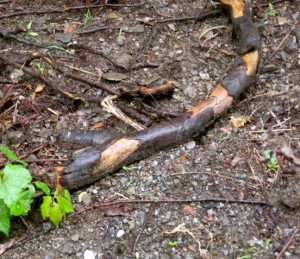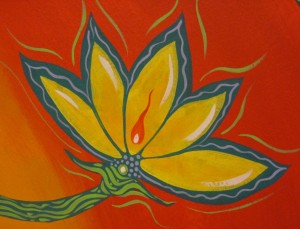Today, we switch things around and publish Chuck’s blog. Jan’s blog, which normally appears on Wednesdays, will be published this Friday instead.

En route to errands, Jan asks: “Did you bring the DVDs for return?” I hadn’t. It was time to turn around, a familiar theme for us these days, as in the past few weeks we have noticed a propensity for making the same trip twice in a day, something always needing a redo. And actually there were two DVDs to return, though we had only watched one. “What is the unseen story?” I ponder, not wanting to get caught in frustration or be disheartened by this unnecessary waste of time, and so I stalk a different attitude as we turn around and slowly drive back home.
“What will we see that we wouldn’t have seen had we not had occasion to retrace our steps? What will we be shown?” I wonder.
Within seconds my questions are answered. Off to the right, deep in a field, I notice what appears to be a German shepherd on its own, standing alertly, sniffing the air. We turn the corner and pull to the side of the road. The animal slowly makes its way towards us, an unmistakable coyote, low to the ground, long bushy tail, triangular face. Barely breathing, we watch as it prances out of the field and cautiously crosses the road right in front of us. What a thrill! But what does it mean?
Coyote is a night hunter. What brings it so boldly into daylight for all to see? Coyote is trickster, a shapeshifter, who teaches folly and wisdom. We are tricked where we are fools, yet through facing our folly honestly we acquire wisdom.
In earnest, I watch the third presidential debate between Obama and Romney. Suddenly, I get it; shapeshifting coyote trickster stands before us in the bright light of scrutiny. Romney has become Obama, adopting nearly all his positions, many of which he disputed but a week ago. Romney has transformed into calm statesman, touting the wisdom of WORLD PEACE!

This shapeshifter actually transforms into a being who in a non-lucid moment doesn’t seem all that bad, actually appearing presidential! Oh what fools we mortals be!
After watching the debate, I am awakened twice in the night by dreams that seize me with fear. In each dream, a psychopathic killer seizes power and is unstoppable. In the morning my waking mood is tense, worried. Not wanting to attach to fear, I penetrate the dreams and the synchronicities of now. Now awake, I clearly see the trickster, come in my dreams to play me, letting me in on the folly of where we are now poised in our world. If we fall for the fool we will eventually get to wisdom, but how rough, how necessary, will that journey be?
Presidents and presidential races attract our projections because they concern our destinies in this world. As well, like kings imbued with divine right, they mirror our inner relations to our own higher powers. As mirrors we must ask ourselves: Are we allowing ourselves to make decisions and take actions in our lives based on our deepest truths, or on foolish illusions we sell ourselves in order to live a safe and complacent life?
The fool will always indulge our weaknesses, but are we willing to out the fool who caters to our inner greed and avoidance of truth? If we refuse inner truth, we certainly will delude ourselves with outer fool, who caters similarly to our greed and fears. We cannot really expect more from our leaders than we do of ourselves. Do we stay mesmerized by the coyote within or the one that walks amongst us in broad daylight? Or do we awaken and heed its warning: Nothing is hidden; it’s right in front of us!
What really matters, the truth, or what we want to believe? Either way, we are led ultimately to wisdom. But the journeys will be very different.
With Coyote,
Chuck









